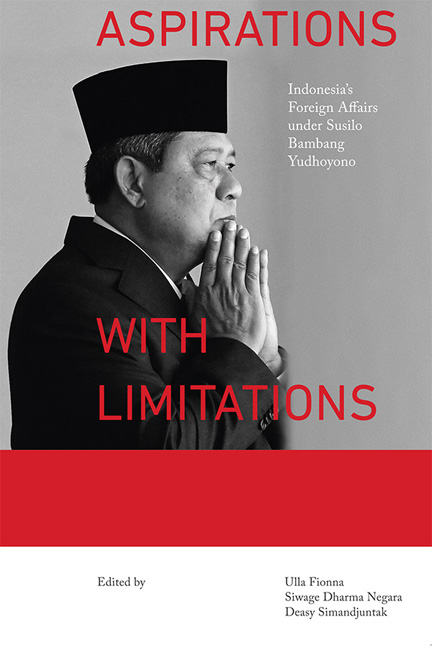Book contents
- Frontmatter
- Contents
- About the Contributors
- 1 Introduction
- 2 Indonesian Foreign Policy: Waging Peace, Stability, and Prosperity
- 3 Indonesia's Diplomatic and Strategic Position under Yudhoyono
- 4 International Economic Cooperation during the Yudhoyono Presidency
- 5 First Term Right, Second Term Shy: A Review of Indonesia's Economic Links with Key Trading Partners
- 6 International Labour Migration: A Very Mixed Blessing
- 7 Law Enforcement, Prevention, and Deradicalization: How SBY Handled Terrorism
- 8 Drifting towards Dynamic Equilibrium: Indonesia's South China Sea Policy under Yudhoyono
- 9 Uneasy Neighbours: Indonesia–Malaysia Relations under Yudhoyono
- 10 A Fair Dinkum Partnership? Australia–Indonesia Ties during the Yudhoyono Era
- 11 The Aceh Peace Process: Wheeling and Dealing behind Closed Doors
- Index
5 - First Term Right, Second Term Shy: A Review of Indonesia's Economic Links with Key Trading Partners
Published online by Cambridge University Press: 08 June 2019
- Frontmatter
- Contents
- About the Contributors
- 1 Introduction
- 2 Indonesian Foreign Policy: Waging Peace, Stability, and Prosperity
- 3 Indonesia's Diplomatic and Strategic Position under Yudhoyono
- 4 International Economic Cooperation during the Yudhoyono Presidency
- 5 First Term Right, Second Term Shy: A Review of Indonesia's Economic Links with Key Trading Partners
- 6 International Labour Migration: A Very Mixed Blessing
- 7 Law Enforcement, Prevention, and Deradicalization: How SBY Handled Terrorism
- 8 Drifting towards Dynamic Equilibrium: Indonesia's South China Sea Policy under Yudhoyono
- 9 Uneasy Neighbours: Indonesia–Malaysia Relations under Yudhoyono
- 10 A Fair Dinkum Partnership? Australia–Indonesia Ties during the Yudhoyono Era
- 11 The Aceh Peace Process: Wheeling and Dealing behind Closed Doors
- Index
Summary
President Susilo Bambang Yudhoyono's (SBY) slogan of “a million friends and zero enemies” was effective in opening doors and is a useful starting point in reviewing how the president managed relations with Indonesia's key trading partners. However, this all-embracing framework is notoriously difficult to implement. In addition, impactful economic policies, it is often argued, rarely make everyone happy. For effective change to take place, one societal group usually gains more than the other, even in an all-win scenario. The argument is that making everyone happy leads to excessive compromise to avoid rocking the boat, which ultimately leads to, at best, incremental change and, at worst, the status quo being maintained.
This cautious and incrementalist theme, with a few exceptions, is reflected throughout SBY's term, and has hampered his administration's ability to chart an optimal course, especially at home. However, in a turbulent setting, where currents are shifting, this method has its merits. This chapter will assess whether SBY's government was able to get the best outcome from its three key trading partners, in light of rising tensions among them. Two of them, the United States and Japan, have had long trade and investment ties with Indonesia, while the third, China, is a more recent player. However, in a relatively short period of time, China has become a dominant economic and political power, dramatically shifting the status quo in the Asia-Pacific region.
This assessment will start with a brief background on how Indonesia's links with its three key trading partners — the United States, Japan and China — have evolved over time. It will then closely review economic policies during SBY's two terms and how they affected commercial links with each of these trading partners. In addition, it will review which of these policies met or fell short of their intended objectives. Finally, the chapter will examine whether there is anything that future governments can learn from the SBY administration's experience to better prepare themselves for further changes in future.
Events Leading up to SBY's Term
The forty-year period from when former President Suharto took over till SBY came into office saw the country's economic floodgates incrementally opening up as the country developed and gained confidence.
- Type
- Chapter
- Information
- Aspirations with LimitationsIndonesia's Foreign Affairs under Susilo Bambang Yudhoyono, pp. 83 - 104Publisher: ISEAS–Yusof Ishak InstitutePrint publication year: 2018



